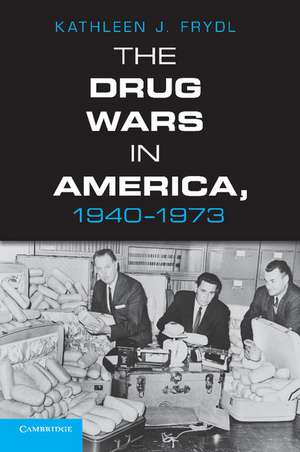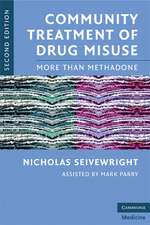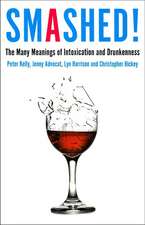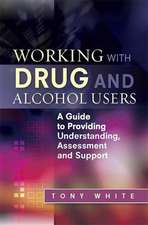The Drug Wars in America, 1940–1973
Autor Kathleen J. Frydlen Limba Engleză Paperback – 21 apr 2013
| Toate formatele și edițiile | Preț | Express |
|---|---|---|
| Paperback (1) | 275.85 lei 6-8 săpt. | |
| Cambridge University Press – 21 apr 2013 | 275.85 lei 6-8 săpt. | |
| Hardback (1) | 506.56 lei 6-8 săpt. | |
| Cambridge University Press – 29 apr 2013 | 506.56 lei 6-8 săpt. |
Preț: 275.85 lei
Nou
Puncte Express: 414
Preț estimativ în valută:
52.79€ • 55.51$ • 43.61£
52.79€ • 55.51$ • 43.61£
Carte tipărită la comandă
Livrare economică 16-30 aprilie
Preluare comenzi: 021 569.72.76
Specificații
ISBN-13: 9781107697003
ISBN-10: 110769700X
Pagini: 458
Ilustrații: 9 b/w illus.
Dimensiuni: 147 x 226 x 33 mm
Greutate: 0.59 kg
Ediția:New.
Editura: Cambridge University Press
Colecția Cambridge University Press
Locul publicării:New York, United States
ISBN-10: 110769700X
Pagini: 458
Ilustrații: 9 b/w illus.
Dimensiuni: 147 x 226 x 33 mm
Greutate: 0.59 kg
Ediția:New.
Editura: Cambridge University Press
Colecția Cambridge University Press
Locul publicării:New York, United States
Cuprins
Part I. 1940–60: Preface; Introduction; 1. Trade in war; 2. Presumptions and pretense: international trade in narcotics; 3. 'A society which requires some sort of sedation': domestic drug consumption, circulation, and perception; Part II. 1960–73: 4. Review and reform: the Kennedy commission; 5. Police and clinics: enforcement and treatment in the city, 1960–73; 6. The cost of denial: Vietnam and the global diversity of the drug trade; Conclusion: war on trade.
Recenzii
'… a sweeping, complex, and searching history of America's drug wars. Kathleen J. Frydl's sophisticated, 'state-centered', analysis helps us to understand in new ways the causes of the nation's greatest social policy failure. A brave and provocative work.' Gary Gerstle, James G. Stahlman Professor of American History, Vanderbilt University
'No one trying to understand the origins and shape of America's war on drugs should miss Frydl's book on the three decades leading up to Nixon's formal declaration. With a connoisseur's taste for irony and shabby bureaucratic squabbles, she offers a cogent account of how drug enforcement became less a realizable goal than a way for the US government to define and legitimate its missions amid uncertainties at home and abroad.' Daniel Richman, Columbia University Law School
'[This] is the most compelling scholarly book to date written on an important subject: America's post-war transition to punitive domestic drug policy. It should be the standard on this topic for many years … [It] is deeply researched in the archives, richly contextualized in the newest trends of US history, and provocative and complex in its analysis. Not just another critique of 'drug war' ideologies, failures and fallacies, it is necessary reading for anyone interested in the issue of reversing the prohibitionist drug regime the United States has built over the last half century. [It] is also timely, given today's crisis of mass incarceration of drug offenders, aggravated by rigid 'maximum minimum' sentencing and racial policing, and the growing public and judicial disillusion with these harms … the best book I've read on this critical subject … a major contribution to the scholarship …' Paul Gootenberg, Criminal Law and Criminal Justice Books
'Frydl presents the reader with a critical analysis of the history of the federal government's drug control policies from 1940 to 1973 … her work is thoughtful, well written and thoroughly documented. It should find a broad audience among political scientists, historians, sociologists, and others who will find this topic engaging. Recommended. Upper-division undergraduate, graduate, research, and professional collections.' J. S. Robey, Choice
'[Frydl] argues persuasively that the drug wars have been essential for the enhancement of state power in both domestic and foreign policy. The work also contributes to our understanding of how state power is built and reinforced, often through narratives that appear to be about something else. Deeply researched and thoughtfully argued, The Drug Wars in America, 1940–1973 tells an important story about why a failed set of policies continues to endure.' Evelyn Krache Morris, Journal of American Studies
'In her engaging history of drug policy, Kathleen J. Frydl argues that America's drug wars began in the four decades after World War II, when the federal government 'amassed an arsenal of tools to punish and prohibit illicit drugs'.' David T. Courtwright, Journal of American History
'No one trying to understand the origins and shape of America's war on drugs should miss Frydl's book on the three decades leading up to Nixon's formal declaration. With a connoisseur's taste for irony and shabby bureaucratic squabbles, she offers a cogent account of how drug enforcement became less a realizable goal than a way for the US government to define and legitimate its missions amid uncertainties at home and abroad.' Daniel Richman, Columbia University Law School
'[This] is the most compelling scholarly book to date written on an important subject: America's post-war transition to punitive domestic drug policy. It should be the standard on this topic for many years … [It] is deeply researched in the archives, richly contextualized in the newest trends of US history, and provocative and complex in its analysis. Not just another critique of 'drug war' ideologies, failures and fallacies, it is necessary reading for anyone interested in the issue of reversing the prohibitionist drug regime the United States has built over the last half century. [It] is also timely, given today's crisis of mass incarceration of drug offenders, aggravated by rigid 'maximum minimum' sentencing and racial policing, and the growing public and judicial disillusion with these harms … the best book I've read on this critical subject … a major contribution to the scholarship …' Paul Gootenberg, Criminal Law and Criminal Justice Books
'Frydl presents the reader with a critical analysis of the history of the federal government's drug control policies from 1940 to 1973 … her work is thoughtful, well written and thoroughly documented. It should find a broad audience among political scientists, historians, sociologists, and others who will find this topic engaging. Recommended. Upper-division undergraduate, graduate, research, and professional collections.' J. S. Robey, Choice
'[Frydl] argues persuasively that the drug wars have been essential for the enhancement of state power in both domestic and foreign policy. The work also contributes to our understanding of how state power is built and reinforced, often through narratives that appear to be about something else. Deeply researched and thoughtfully argued, The Drug Wars in America, 1940–1973 tells an important story about why a failed set of policies continues to endure.' Evelyn Krache Morris, Journal of American Studies
'In her engaging history of drug policy, Kathleen J. Frydl argues that America's drug wars began in the four decades after World War II, when the federal government 'amassed an arsenal of tools to punish and prohibit illicit drugs'.' David T. Courtwright, Journal of American History
Notă biografică
Descriere
Examines how and why the US government went from regulating illicit drug traffic and consumption to declaring war on both.









